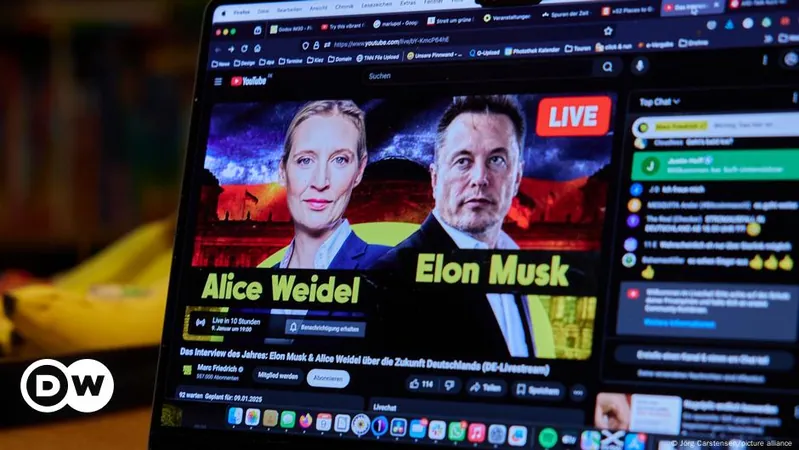
Elon Musk Sparks Controversy with Live Discussion Featuring Far-Right AfD Leader Alice Weidel Ahead of German Elections
2025-01-09
Author: Ting
Introduction
In a striking political moment, Elon Musk hosted a live discussion on his social media platform X with Alice Weidel, the co-leader and chancellor candidate for the far-right Alternative for Germany (AfD) party. As Germany braces for its general elections scheduled for February 23, 2025, Weidel’s party has been garnering attention, currently polling in the second position with an estimated support of 20%.
Backlash and Audience Reception
Musk's engagement with Weidel has been met with significant backlash across Germany, as mainstream political parties have publicly rejected any possibility of coalition with the AfD, creating a challenging environment for the party’s ambitions of gaining governmental power. Despite the backlash, the live stream drew an estimated audience peaking at over 200,000 viewers.
Expert Analysis
Political analysts have pointed out the complexities involved in Musk’s choice to platform a far-right politician. Marietje Schaake, a political expert and fellow at Stanford University, expressed skepticism regarding the potential impact of the conversation, noting that the event felt “awkward” and “underwhelming.” She added that while Musk's platforming of far-right voices could amplify their reach, the actual effect on the political landscape may be limited.
Weidel's Defense and Critique
During the discussion, Weidel defended her party against accusations of extremism. She labeled the AfD as a “conservative” and “libertarian” party, asserting that they have been unfairly characterized as far-right. This claim comes alongside the ongoing scrutiny the AfD faces from German authorities, as investigations are underway to determine if the party has ties to extremist ideologies.
Political Topics Discussed
Among the topics addressed were contentious points from Germany's political history, including Angela Merkel’s controversial refugee policies during the 2015 crisis. Weidel criticized Merkel’s decisions, reflecting her party's anti-immigration stance, and argued these policies had negative ramifications for German society.
Energy Policies and Current Events
The discussion also delved into various topics, ranging from energy policies to the political ramifications of current events, such as the ongoing conflict in Ukraine. Weidel’s critique of Germany's reliance on Russian gas and her contentious remarks on coal usage highlighted her party’s emphasis on energy independence.
Musk's Remarks and Overall Reception
Outside of the political discourse, Musk’s remarks ranged from lofty aspirations of colonizing Mars to philosophical musings on existential topics, which juxtaposed the weighty nature of the political discussion. These segments drew both intrigue and criticism from viewers, as the combination of casual and serious tones led to a mixed reception.
Conclusion
In a broader context, this event has raised questions about the influence of tech giants in political affairs. Musk's act of facilitating a platform for Weidel has sparked fears regarding the potential shift in voting dynamics and the political landscape in Europe. With the AfD gaining traction in polls, the implications of such a high-profile endorsement from a global figure like Musk cannot be understated. It remains to be seen how this will affect the upcoming elections and the potential alignment of parties within Germany’s political framework.


 Brasil (PT)
Brasil (PT)
 Canada (EN)
Canada (EN)
 Chile (ES)
Chile (ES)
 Česko (CS)
Česko (CS)
 대한민국 (KO)
대한민국 (KO)
 España (ES)
España (ES)
 France (FR)
France (FR)
 Hong Kong (EN)
Hong Kong (EN)
 Italia (IT)
Italia (IT)
 日本 (JA)
日本 (JA)
 Magyarország (HU)
Magyarország (HU)
 Norge (NO)
Norge (NO)
 Polska (PL)
Polska (PL)
 Schweiz (DE)
Schweiz (DE)
 Singapore (EN)
Singapore (EN)
 Sverige (SV)
Sverige (SV)
 Suomi (FI)
Suomi (FI)
 Türkiye (TR)
Türkiye (TR)
 الإمارات العربية المتحدة (AR)
الإمارات العربية المتحدة (AR)